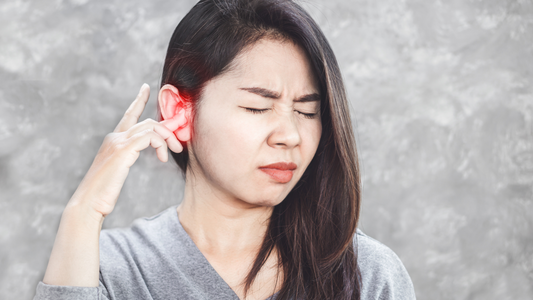Struggling to hear the chatter at dinner or feeling wobbly when you're reaching for that top shelf? Let's focus on a small part of your body with a big impact: the inner ear. It's crucial for making sense of sounds and maintaining balance. And when it's out of whack, you might find yourself asking folks to repeat themselves or grabbing onto something to avoid a fall. Now, that spinning sensation when you move too quickly? That's your inner ear signaling trouble.
So what's behind the times you can't catch what your grandkids say or the moments you need a second to steady yourself? It could be changes in this delicate part of the ear, changes that slide into our routine so subtly we hardly take note. Without getting too technical, let's understand the marvels inside our ear that handle sounds and balance. We're about to learn more about our personal sound equipment.
Peering Inside the Human Auditory System
Think of the inner ear as a tiny, intricate puzzle hidden in your head, critical for hearing and balance. Sounds we hear start by nudging the minuscule hairs in our ear canals and then knocking on our eardrum – and no, we're not talking about the drums in a jazz band. That eardrum sends vibrations to a small group of bones you might recall as the hammer, anvil, and stirrup, all tiny yet mighty parts in the grand scheme of hearing.
Discovering the Labyrinthine Inner Ear
Moving inward past these bones, you'd find the maze-like inner ear. Ever consider how we don't topple over when we do a headstand or spin around? Well, it's a bit like having a water park inside your skull. The movement sloshes the fluid around, activating fine hairlike sensors. These sensors clue in our brain about our body’s orientation. If these little guys weren't there, a simple somersault might feel like floating in zero gravity!
Listening to the Inner Ear's Tiny Orchestra
But there's more: nestled within this complex maze is the cochlea, the conductor of our auditory system. Think of it like a miniature piano stocked with hairs instead of keys. They respond to their unique sound waves by "playing their notes," which gets translated into something our brain comprehends as noise. Not magic — just everyday sound science at work right inside our own heads. As we delve deeper into how we hear, let's attune ourselves to our body's fascinating acoustic symphony.
Understanding Hearing Loss
What does it mean when the once crystal-clear notes from your inner ear get fuzzy? That’s hearing loss for you. Consider the strain of trying to grasp every word your grandchild says, or needing the TV volume a couple of notches higher. It's not solely about loudness but about sounds becoming dull, less distinct. Some folks notice they're often asking for sentences to be repeated during a conversation. It’s those tiny inner ear soldiers no longer keeping up with the rhythms they once marched to. And hearing loss doesn’t discriminate; for some, it’s as minor as not catching the chirp of a bird or as major as completely missing a phone call. The subtle onset is the tricky part – it’s not uncommon for it to anchor itself into your routine before you really notice the change.
Types of Hearing Loss
Conductive Hearing Loss: When something’s in the way
You know when you can't get to your favorite spot because something's blocking the way? That's kind of like conductive hearing loss. Something's jamming up the sound path to your inner ear, maybe earwax or an ear infection. The upside? This can often be sorted out, kind of like clearing the blockage.
Sensorineural Hearing Loss: When the inner ear gets worn out
Consider an old radio that’s not as sharp with the tunes anymore. This is sensorineural hearing loss. It's about wear and tear on the inner ear's hair cells or nerves, often from age or a noisy life. If these tiny hairs give out, they're not coming back—it's a one-way street.
Mixed Hearing Loss: Dealing with double trouble
Combine a blocked path with that staticky radio, and you've got mixed hearing loss. You're looking at both conductive and sensorineural troubles at the same time. It's as challenging as trying to follow your grandkid's storytelling with a bunch of noise in the background.
Hearing Loss Causes
Curious about what can cause hearing difficulties? Aging is a common culprit. Just as certain car parts can wear out over time, the ear can start to show its miles too. And there's a host of other factors that might make hearing a bit harder.
Noise-Induced Hearing Loss: When Sound Becomes Too Much
Ever been near blaring speakers at a concert? Or worked with loud machinery without ear protection? These noisy environments can damage the delicate hairs in your ears that are vital for hearing. Over time, if these hairs don't bounce back, your hearing can degrade. It's similar to repeatedly walking on grass; eventually, it won't spring back, leaving you with bare patches.
Ear Infection: The Unwelcome Guest
An ear infection can be compared to a lingering cold. It's bothersome and can obstruct your hearing. Chronic infections, or ones not properly treated, can lead to persistent hearing problems. Just as handwashing is essential for keeping germs at bay, ear care is crucial to prevent infections that could hamper your hearing.
Medication: Good Intentions, Unintended Consequences
Certain medications intended to treat other health issues may inadvertently affect our hearing. It's an unintentional side effect. Picture a garden hose meant to water plants overshooting its mark and drenching the walkway instead.
There are more reasons that might explain why someone's hearing isn't what it used to be. It might be a condition present from birth or an event that has impacted their ears. Looking after our ears is akin to wearing a helmet when biking—it's a smart move to safeguard our ability to enjoy life's soundtrack.
Hearing Loss Vertigo
Walking along and the room starts to spin without warning – that's vertigo. This isn't a sign a storm's brewing, it's an uninvited guest that could signal hearing loss. Vertigo feels like you're moving or the world is spinning around you while you're standing still. For those who experience it, imagine the disorientation of trying to navigate through a funhouse tunnel – that can be everyday reality.
Why Vertigo and Hearing Loss Often Go Hand in Hand

Ever ask yourself why vertigo seems to tag along with hearing loss? It's because your inner ear is pulling double duty; it’s handling both your ability to hear and your balance. If it starts glitching, your hearing might take a hit, and you could get the spins. Trying to focus at your weekly card game or following a recipe can become a challenge.
Spotting the Sneaky Signs
There you are, out for a morning walk, and out of nowhere you feel like you're riding the teacups at an amusement park. Vertigo typically doesn't show up alone. It might bring a headache, or a bout of nausea, or maybe a buzzing in your ears. These tell-tale signs are your body sending out an SOS that your equilibrium’s thrown off kilter.
No one wants this party crasher in their life. Best to catch on to these symptoms early, so you can show vertigo the door before it overstays its welcome. Next time your balance feels off, keep in mind it's not a game you have to play along with.
Getting to the Root of the Spin
Curious about the unexpected dizzy spell when all you did was look up? Sometimes it's caused by tiny crystals in your ears getting knocked loose – and no, we're not talking about gemstones. Or maybe a bug going around snuck its way into your inner ear. Unlike common cold congestion though, this can throw off your whole game.
But there's a bright side: Finding steadiness can be as doable as getting that wonky chair leg fixed. Doctors have a toolbox of tricks, from balance exercises to medications, to keep you feeling grounded – no sailor’s sea legs needed here.
Conclusion
Dealing with vertigo and hearing challenges can throw a wrench in your daily life, but proper care can help you maintain your routine without too many hiccups. If you’re struggling to hear or keep your balance, it's not something to brush off as normal aging. These symptoms may be your body's way of signaling trouble. Quick action can prevent more serious issues, so see your doctor rather than trying home remedies.
Suppose you start feeling unsteady or notice your hearing isn’t quite right. In that case, it’s time to have a straightforward conversation with your doctor. An early response can often mean the difference between a minor adjustment and a long-term problem. You might just get back to dancing or catching every word of the conversation sooner than you think. So, reach out to your healthcare provider and keep enjoying the rhythm of life!
Wrap-Up: Embracing Our Inner Symphony
Our inner ears matter more than you might think. They keep us connected to the sounds we love and play a part in our balance. When hearing starts to decline, or our step loses its sureness, it's a hint those little inner workings need some TLC, sort of like when a trusty watch stops keeping time just right.
If you're finding it tough to follow conversations or walking a straight line seems more effortful, it's alright to reach out for help. Maybe it's time to try out a hearing aid to bring those notes back into focus. At HearWell Group, we have the resources to recalibrate your hearing experience. Let's keep the beat going strong—ask for help when you need it and keep savoring every moment of life’s rich soundscape.
Sources & References
- Ekdale, E. G. (2013). Comparative anatomy of the bony labyrinth (inner ear) of placental mammals. PLoS One, 8(6), e66624. https://www.ncbi.nlm.nih.gov/pmc/articles/PMC3691227/
- Eatock, R. A., & Songer, J. E. (2011). Vestibular hair cells and afferents: two channels for head motion signals. Annual Review of Neuroscience, 34, 501-534. https://www.ncbi.nlm.nih.gov/pmc/articles/PMC3590856/
- Lysakowski, A., & Goldberg, J. M. (2004). Morphophysiology of the vestibular periphery. The Vestibular System, 57-152. https://link.springer.com/chapter/10.1007/0-387-21567-0_3

The Hear Well Group Research Team: Trusted Hearing Health Insights
Our experienced research team compiles hearing health data from credible, peer-reviewed sources and presents it in easy-to-understand terminology. We ensure accuracy and trustworthiness, providing up-to-date, evidence-based recommendations to enhance hearing care practices and inform our readers' hearing well-being decisions.


